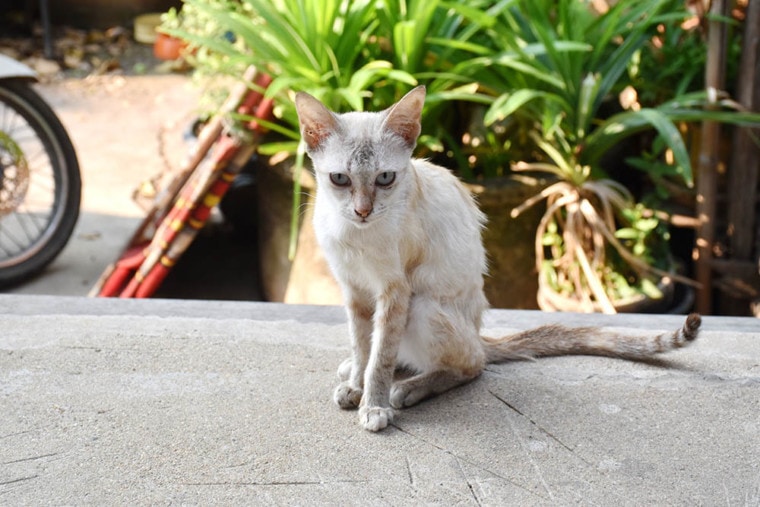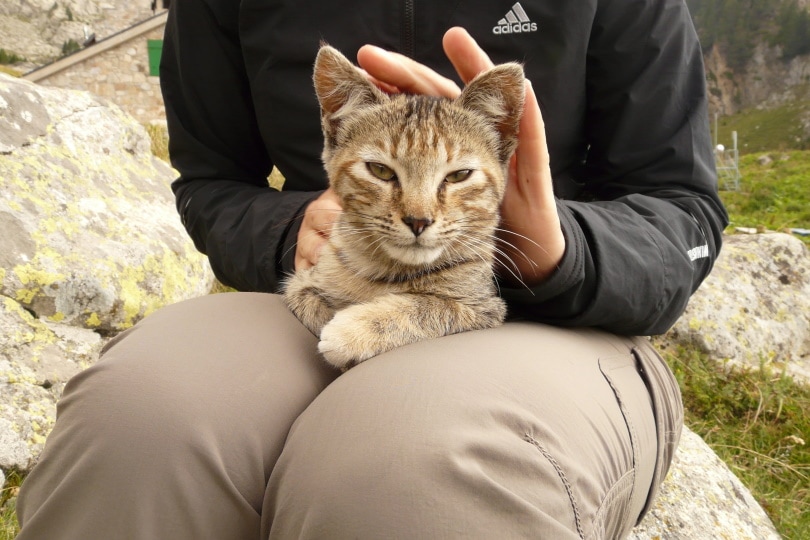
Most of the time, cat owners are advised to avoid overfeeding to avoid feline obesity. While obesity is more common, being underweight is also a cause for concern. It’s important for cats to be fed the right amount of healthy, nutritious food to remain at a healthy weight.
If you suspect that your cat may be underweight or losing weight, it’s important to consult with your veterinarian. Only they will be able to truly tell you whether your cat’s weight or weight loss is a concern and advise you on how to treat it, especially if there is an underlying disease affecting their weight.
How to Determine If Your Cat Is Underweight
There are a few tests you can conduct at home to help you determine if your cat is underweight.
These at-home tests can be used as a first-line in determining whether your cat is underweight or simply slender-built. If you find that your cat has a pronounced spine or ribcage, you should follow up with a vet to have them perform a more thorough exam.

Helping an Underweight Cat
There are a few things you can do to help if you suspect that your cat is underweight.
The first thing you should do is monitor your cat’s eating. If they aren’t finishing their food or are suffering from appetite loss, this can indicate many things. Providing your vet with as much information as possible will help them come up with a long-term solution.
If your cat scarfs down its food and is looking for more, check to make sure you are feeding them the right amount of food. Different brands of cat food have different feeding requirements, so make sure they’re getting enough for their size, age, and activity level. If you’re in doubt, your vet can recommend the best cat food and feeding amount for your cat.
If you have multiple cats, it’s worth checking to make sure that your cat is getting all her food. Cat’s can be competitive at mealtime, and sometimes one cat doesn’t get to eat. Feeding your cats in separate rooms can help ensure that all of your feline companions stay healthy.
How to Help a Cat Gain Weight
If your vet has ruled out any underlying health conditions, there are several ways to help an underweight cat to gain weight.
Some cats have a higher metabolic rate than others and simply need more calories in their food. Senior cats also sometimes need senior food that is more easily digested than regular adult cat food.
Complement this information by using our cat calculator tool here:
The exact amount of calories an individual animal needs to maintain a healthy weight is variable and influenced by many factors including genetics, age, breed, and activity level. This tool is meant to be used only as a guideline for healthy individuals and does not substitute veterinary advice
High-quality cat food is an important part of fostering a long and healthy life for your cat but the right cat food and water dish will promote good posture, offer whisker relief, and aid in good digestion. The Hepper NomNom Cat Bowl is our favorite bowl since it offers all of the above and is beautifully crafted to meet modern home stylings. The wide tray design catches any food and water spills and the entire setup is dishwasher safe. Learn more about the Hepper NomNom Cat Bowl here.
At Pet Keen, we’ve admired Hepper for many years and decided to take a controlling ownership interest so that we could benefit from the outstanding designs of this cool cat company!
Summary
If you think your cat is underweight, it is important to consult your vet to make sure they simply need more calories in their diet and that there isn’t an underlying illness that’s causing their weight loss. If your cat simply isn’t getting enough food, there are several steps you can take to increase their intake and make their food more appealing.
You may also want to read:
- Is My Cat Too Underweight? Here’s How to Tell if Your Cat is Too Skinny
- 2 Unique Thai Dog Breeds You’ve Got to See (With Pictures)
Featured Image Credit: Benchamaporn Kanlapungha, Shutterstock







